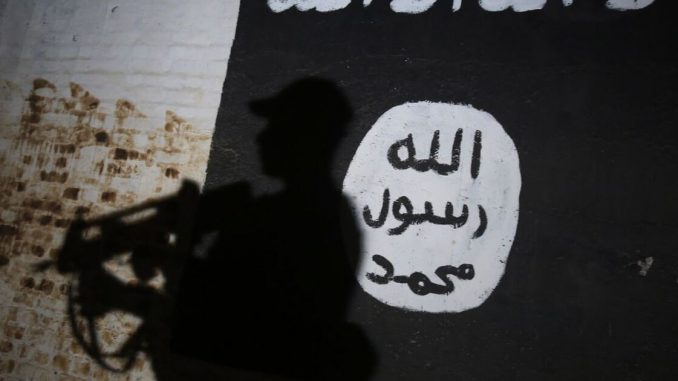
UNITED NATIONS — The new U.S. administration said Tuesday a top priority in Iraq is to help the country assert its sovereignty “in the face of enemies” by preventing a resurgence of the extremist Islamic State group and addressing destabilizing activities of Iran and Iranian-backed militias.
U.S. deputy ambassador Richard Mills told the U.N. Security Council that President Joe Biden’s administration “supports a strategic partnership with a stable, democratic Iraq,” including backing efforts to control militias and advising and assisting the country’s counter-terrorism forces.
The United States will also be “a steady, reliable partner that supports Iraq’s anti-corruption and economic reform efforts, strengthens regional relationships, holds accountable human rights violators and those who abuse human rights, (and) provides humanitarian assistance,” Mills said.
The Islamic State extremist group seized Iraqi cities and declared a self-styled Islamic caliphate in a large swathe of territory it took control of in Iraq and neighboring Syria in 2014. U.S. airstrikes and a U.S.-backed, Iraqi-led ground campaign led to the group’s defeat in Iraq in 2017, leaving tens of thousands dead and Iraqi cities in ruins.
But the group’s sleeper cells continue to launch attacks in different parts of Iraq including on a market in Baghdad in December that killed at least 30 people and wounded over 100.
/cloudfront-us-east-1.images.arcpublishing.com/mco/LE3VRZ7TBRB2LA4HFCDY42NQZI.jpg)
Mills said helping Iraq prevent a resurgence of ISIS and working toward the country’s stability also means supporting its efforts to hold peaceful elections on Oct. 10, four months later than originally planned.
“These scheduled elections will be critical in establishing responsive and representative government,” he said.
Mills referred to the hundreds of thousands of protesters who have taken to the streets in Baghdad and the predominantly Shiite south since late 2019. Protesters have called for an end to endemic corruption by a political class largely seen as having squandered Iraq’s oil resources through greed and mismanagement over the years. They have demanded political and economic reforms including early elections. The protests were met with a heavy military crackdown and hundreds were killed.
Mills said the U.S. welcomes a recent letter from the Iraqi government to the Security Council asking the U.N. political mission in Iraq known as UNAMI to provide election observers.
“We support international observation of Iraqi elections to ensure that the elections are free, fair and credible, and look forward to working with Iraq, the council, fellow members, and the U.N. to determine the most feasible form such an effort can take,” he said.
The U.S. is providing $9.7 million to UNAMI to assist the government’s election preparations, and Mills encouraged international donors to also contribute.
He said one of the highest barriers to credible elections is the presence of “armed militias, violent extremists, and spoilers.” He urged Iraq’s electoral administration and key security personnel to start working immediately to ensure security around the elections.
Mills stressed that militias, including those backed by Iran, and remaining Islamic State elements are killing Iraqis, attacking U.N. convoys, targeting diplomats and non-governmental organizations, “and depriving Iraq of much-needed economic relief and foreign investment.”
/cloudfront-us-east-1.images.arcpublishing.com/mco/LTL72DPB5FAZ7L2WK73EI3WR3Y.jpg)
He pointed to Monday’s rocket attack outside Irbil international airport, near where U.S. forces are based in the semi-autonomous Kurdish-run region of northern Iraq, killing a civilian contractor working for the U.S.-led coalition and injuring at least eight other people including an American.
U.N. special envoy Jeanine Hennis-Plasschaert told the council that “reckless attempts to inflame tensions,” like the Irbil attack, “pose grave threats to Iraq’s stability.”
She said “a positive, stable relationship between federal Iraq and the Kurdistan region is absolutely essential to the stability of the whole country.” And she lamented “the harsh reality” that Baghdad and Irbil have failed to agree on key laws including on sharing oil revenue and disputed territories.
/cloudfront-us-east-1.images.arcpublishing.com/mco/TDUYPWCATJFT5CQGVC4IE3LGGI.jpg)
As for the October election, Hennis-Plasschaert said parliament has passed legislation to finance the voting process, and countrywide registration of candidates and alliances as well as the updating of voter lists has begun. But she said parliament must immediately finalize the Federal Supreme Court law because the court certifies election results.
Looking at the year ahead, she said, “Iraqis hope to turn the page on a number of fronts: recovery from the pandemic, elections, economic reform, strengthening the rule of law and delivering a more secure environment for all.”
But this requires decisive and concerted action, including meaningful reforms and refuting “poisonous” misinformation and conspiracies, Hennis-Plasschaert stressed.
“For elections to be trusted, unfounded theories must be disproved, baseless accusations refuted, intimidation replaced with accountability,” she said. “Transparency must rule and loyalties cannot be for sale.”



Be the first to comment